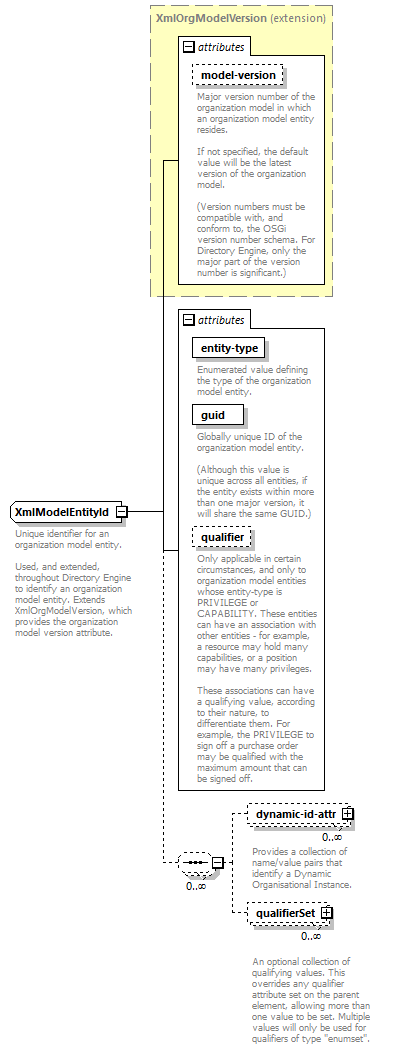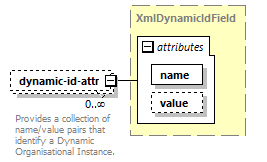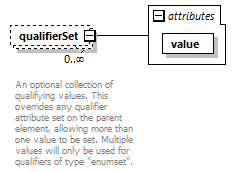| diagram |  |
||||||||||||||||||||||||||||||||||||||
| namespace | http://api.organisation.common.n2.tibco.com | ||||||||||||||||||||||||||||||||||||||
| type | extension of XmlOrgModelVersion | ||||||||||||||||||||||||||||||||||||||
| properties |
|
||||||||||||||||||||||||||||||||||||||
| children | dynamic-id-attr qualifierSet | ||||||||||||||||||||||||||||||||||||||
| attributes |
|
||||||||||||||||||||||||||||||||||||||
| annotation |
|
||||||||||||||||||||||||||||||||||||||
| source | <xs:complexType name="XmlModelEntityId"> <xs:annotation> <xs:documentation>Unique identifier for an organization model entity. Used, and extended, throughout Directory Engine to identify an organization model entity. Extends XmlOrgModelVersion, which provides the organization model version attribute. </xs:documentation> </xs:annotation> <xs:complexContent> <xs:extension base="XmlOrgModelVersion"> <xs:sequence minOccurs="0" maxOccurs="unbounded"> <xs:element name="dynamic-id-attr" type="XmlDynamicIdField" minOccurs="0" maxOccurs="unbounded"> <xs:annotation> <xs:documentation>Provides a collection of name/value pairs that identify a Dynamic Organisational Instance.</xs:documentation> </xs:annotation> </xs:element> <xs:element name="qualifierSet" minOccurs="0" maxOccurs="unbounded"> <xs:annotation> <xs:documentation> An optional collection of qualifying values. This overrides any qualifier attribute set on the parent element, allowing more than one value to be set. Multiple values will only be used for qualifiers of type "enumset".</xs:documentation> </xs:annotation> <xs:complexType> <xs:attribute name="value" type="xs:string" use="required"/> </xs:complexType> </xs:element> </xs:sequence> <xs:attribute name="entity-type" type="OrganisationalEntityType" use="required"> <xs:annotation> <xs:documentation>Enumerated value defining the type of the organization model entity.</xs:documentation> </xs:annotation> </xs:attribute> <xs:attribute name="guid" type="xs:string" use="required"> <xs:annotation> <xs:documentation>Globally unique ID of the organization model entity. (Although this value is unique across all entities, if the entity exists within more than one major version, it will share the same GUID.)</xs:documentation> </xs:annotation> </xs:attribute> <xs:attribute name="qualifier" type="xs:string" use="optional"> <xs:annotation> <xs:documentation>Only applicable in certain circumstances, and only to organization model entities whose entity-type is PRIVILEGE or CAPABILITY. These entities can have an association with other entities - for example, a resource may hold many capabilities, or a position may have many privileges. These associations can have a qualifying value, according to their nature, to differentiate them. For example, the PRIVILEGE to sign off a purchase order may be qualified with the maximum amount that can be signed off.</xs:documentation> </xs:annotation> </xs:attribute> </xs:extension> </xs:complexContent> </xs:complexType> |
attribute XmlModelEntityId/@entity-type
| type | OrganisationalEntityType | |||||||||||||||||||||||||||||||||||||||||||||||||||||||||||||||||||||
| properties |
|
|||||||||||||||||||||||||||||||||||||||||||||||||||||||||||||||||||||
| facets |
|
|||||||||||||||||||||||||||||||||||||||||||||||||||||||||||||||||||||
| annotation |
|
|||||||||||||||||||||||||||||||||||||||||||||||||||||||||||||||||||||
| source | <xs:attribute name="entity-type" type="OrganisationalEntityType" use="required"> <xs:annotation> <xs:documentation>Enumerated value defining the type of the organization model entity.</xs:documentation> </xs:annotation> </xs:attribute> |
attribute XmlModelEntityId/@guid
| type | xs:string | ||
| properties |
|
||
| annotation |
|
||
| source | <xs:attribute name="guid" type="xs:string" use="required"> <xs:annotation> <xs:documentation>Globally unique ID of the organization model entity. (Although this value is unique across all entities, if the entity exists within more than one major version, it will share the same GUID.)</xs:documentation> </xs:annotation> </xs:attribute> |
attribute XmlModelEntityId/@qualifier
| type | xs:string | ||
| properties |
|
||
| annotation |
|
||
| source | <xs:attribute name="qualifier" type="xs:string" use="optional"> <xs:annotation> <xs:documentation>Only applicable in certain circumstances, and only to organization model entities whose entity-type is PRIVILEGE or CAPABILITY. These entities can have an association with other entities - for example, a resource may hold many capabilities, or a position may have many privileges. These associations can have a qualifying value, according to their nature, to differentiate them. For example, the PRIVILEGE to sign off a purchase order may be qualified with the maximum amount that can be signed off.</xs:documentation> </xs:annotation> </xs:attribute> |
element XmlModelEntityId/dynamic-id-attr
| diagram |  |
||||||||||||||||||
| type | XmlDynamicIdField | ||||||||||||||||||
| properties |
|
||||||||||||||||||
| attributes |
|
||||||||||||||||||
| annotation |
|
||||||||||||||||||
| source | <xs:element name="dynamic-id-attr" type="XmlDynamicIdField" minOccurs="0" maxOccurs="unbounded"> <xs:annotation> <xs:documentation>Provides a collection of name/value pairs that identify a Dynamic Organisational Instance.</xs:documentation> </xs:annotation> </xs:element> |
element XmlModelEntityId/qualifierSet
| diagram |  |
||||||||||||
| properties |
|
||||||||||||
| attributes |
|
||||||||||||
| annotation |
|
||||||||||||
| source | <xs:element name="qualifierSet" minOccurs="0" maxOccurs="unbounded"> <xs:annotation> <xs:documentation> An optional collection of qualifying values. This overrides any qualifier attribute set on the parent element, allowing more than one value to be set. Multiple values will only be used for qualifiers of type "enumset".</xs:documentation> </xs:annotation> <xs:complexType> <xs:attribute name="value" type="xs:string" use="required"/> </xs:complexType> </xs:element> |
attribute XmlModelEntityId/qualifierSet/@value
| type | xs:string | ||
| properties |
|
||
| source | <xs:attribute name="value" type="xs:string" use="required"/> |
WSDL documentation generated by XMLSpy WSDL Editor http://www.altova.com/xmlspy